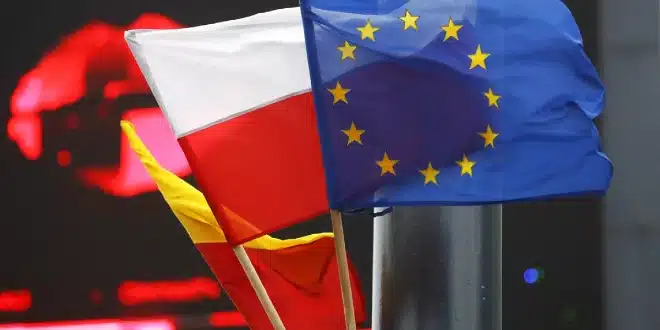Poland officially commenced its six-month presidency of the Council of the European Union with a grand ceremony at Warsaw’s Grand Theatre. The event featured a performance by musicians from the Polish National Opera and was broadcast live on Poland’s national television network, TVP1.
Among the attendees were Polish Prime Minister Donald Tusk and European Council President António Costa. During his speech, Costa emphasized Poland’s growing role as a central figure in European defense and a key player in the EU’s single market. He also reaffirmed the bloc’s commitment to supporting Ukraine for as long as necessary to ensure lasting peace.
Tusk highlighted Poland’s role as a “guardian of solidarity,” referencing the country’s historic pro-democracy Solidarity movement from the 1980s, which began in his hometown of Gdansk.
Poland’s presidency will prioritize defense and security, adopting the slogan “Security, Europe!” The government’s official program stresses the need for Europe to enhance its defense capabilities in response to Russia’s ongoing aggression against Ukraine. It calls for coordinated efforts on European defense, complementing NATO’s initiatives.
Migration policy is also a major focus, with Poland advocating for stronger border protections and new solutions to manage migration challenges. The program underscores the need to curb irregular migration and improve the effectiveness of return policies through collaboration with non-EU countries. Poland’s current government has continued the previous administration’s strict approach to controlling irregular migration along the heavily fortified border with Belarus.
The gala event was attended by members of the Polish government and various ambassadors, but Hungary’s ambassador was notably absent due to ongoing tensions between the two nations. The diplomatic rift stems from Hungary’s recent decision to grant political asylum to Marcin Romanowski, an opposition Law and Justice (PiS) MP and former deputy justice minister, who is facing multiple charges of misusing public funds. After learning that Romanowski had fled to Hungary, Polish authorities issued a European arrest warrant, which remains active.
Polish Deputy Minister for European Affairs Magdalena Sobkowiak-Czarnecka confirmed in an interview with TVP Info that Hungary’s ambassador was not welcome at the event.
Poland’s presidency follows Hungary’s contentious tenure, during which Hungarian Prime Minister Viktor Orbán met with Russian President Vladimir Putin in Moscow, sparking criticism from other EU leaders.
Polish President Andrzej Duda, who has ties to the nationalist Law and Justice party, was also absent from the ceremony. Instead, he was represented by a senior official from his office. Since the formation of Poland’s pro-EU coalition government in December 2023, relations between Duda’s office and Tusk’s administration have been strained, particularly due to efforts to reverse the rule-of-law changes enacted by the previous government.
Outside the venue, hundreds of Polish farmers staged protests against the EU’s free trade agreement with South America’s Mercosur bloc, the European Green Deal, and the importation of Ukrainian agricultural products.
During Poland’s presidency, more than 20 informal EU ministerial meetings and over 300 official EU-level gatherings are scheduled to take place.
 The Daily Star Ireland
The Daily Star Ireland

